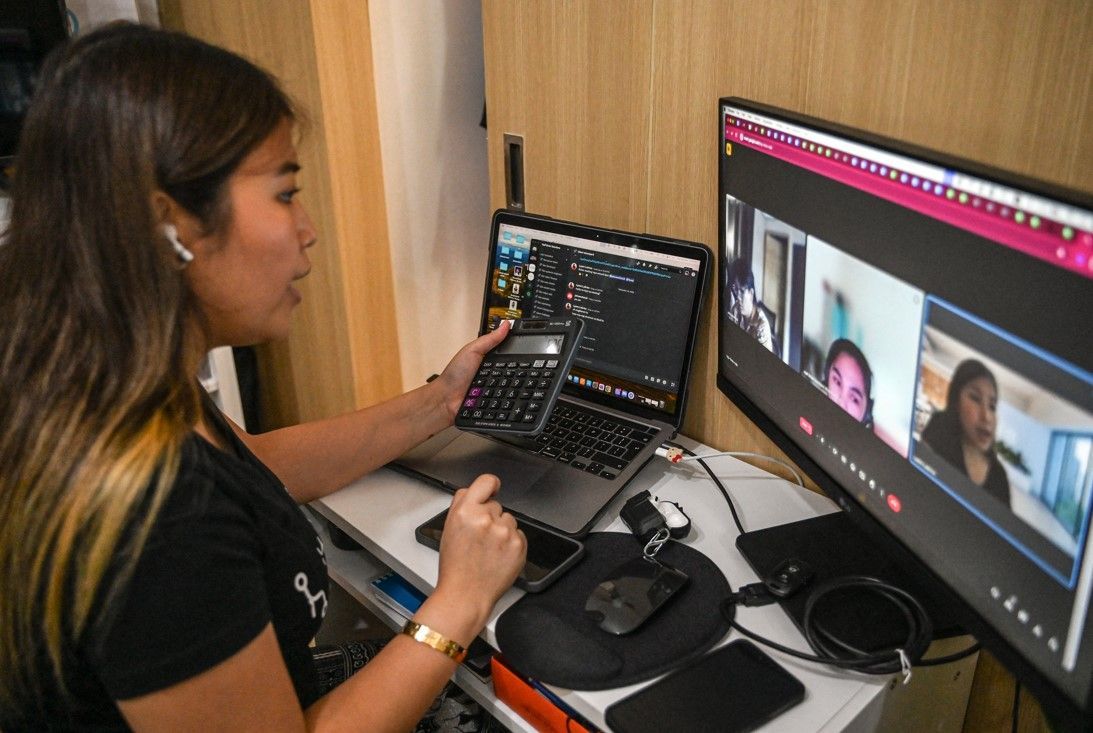Gov’t urged to develop policies for flexible work arrangements
ADVERTISEMENT

Welcome, Kapamilya! We use cookies to improve your browsing experience. Continuing to use this site means you agree to our use of cookies. Tell me more!
Gov’t urged to develop policies for flexible work arrangements
Marilyn Cahatol,
ABS-CBN News
Published Jun 29, 2025 01:02 PM PHT
 This photo taken on September 26, 2024, shows Philippine's "virtual assistant" Lyann Lubrico working at her home in Quezon City, Metro Manila. Mago's workday begins after she's tucked her three daughters into bed and flicked off the lights in their house. Jam Sta Rosa, AFP
This photo taken on September 26, 2024, shows Philippine's "virtual assistant" Lyann Lubrico working at her home in Quezon City, Metro Manila. Mago's workday begins after she's tucked her three daughters into bed and flicked off the lights in their house. Jam Sta Rosa, AFP
 This photo taken on September 26, 2024, shows Philippine's "virtual assistant" Lyann Lubrico working at her home in Quezon City, Metro Manila. Mago's workday begins after she's tucked her three daughters into bed and flicked off the lights in their house. Jam Sta Rosa, AFP
This photo taken on September 26, 2024, shows Philippine's "virtual assistant" Lyann Lubrico working at her home in Quezon City, Metro Manila. Mago's workday begins after she's tucked her three daughters into bed and flicked off the lights in their house. Jam Sta Rosa, AFP MANILA — Sen. Sherwin Gatchalian on Sunday, June 29, urged the government and private sector to allow flexible working arrangements for young Filipino employees.
MANILA — Sen. Sherwin Gatchalian on Sunday, June 29, urged the government and private sector to allow flexible working arrangements for young Filipino employees.
Gatchalian highlighted that flexible works set-ups have been a growing preference among young workers.
Gatchalian highlighted that flexible works set-ups have been a growing preference among young workers.
He said the Department of Labor and Employment “should adopt stronger policies to support remote work and protect digital workers, including freelancers.”
He said the Department of Labor and Employment “should adopt stronger policies to support remote work and protect digital workers, including freelancers.”
REMOTE, DIGITAL AND FREELANCE WORKERS
He said the government must focus on conducting targeted skills training to equip Filipinos for emerging digital roles.
He said the government must focus on conducting targeted skills training to equip Filipinos for emerging digital roles.
ADVERTISEMENT
The senator underscored that failure to adapt to the preference of the new generation of workers could “risk losing our youth to opportunities abroad or to employers better aligned with their needs.”
The senator underscored that failure to adapt to the preference of the new generation of workers could “risk losing our youth to opportunities abroad or to employers better aligned with their needs.”
The Philippines is among five countries job-seeking platform Upwork listed as top sources of virtual assistants for foreign employees, a job that allows employees to work full-time under a work-from-home arrangement.
The Philippines is among five countries job-seeking platform Upwork listed as top sources of virtual assistants for foreign employees, a job that allows employees to work full-time under a work-from-home arrangement.
“Kailangan nating sumabay sa mabilis na pagbabago ng panahon upang matiyak ang mas mataas na productivity at maayos na kinabukasan para sa ating manggagawa,” he said.
“Kailangan nating sumabay sa mabilis na pagbabago ng panahon upang matiyak ang mas mataas na productivity at maayos na kinabukasan para sa ating manggagawa,” he said.
(We need to adapt to the changes of the new era to ensure higher productivity and promising future for our workers.)
(We need to adapt to the changes of the new era to ensure higher productivity and promising future for our workers.)
TELECOMMUTING ACT
Republic Act No. 11165, or the Telecommuting Act, institutionalized telecommuting—or working in alternative workplaces—on a voluntary basis in the private sector for the same treatment as employees working onsite.
Republic Act No. 11165, or the Telecommuting Act, institutionalized telecommuting—or working in alternative workplaces—on a voluntary basis in the private sector for the same treatment as employees working onsite.
The world shifted to remote work during the COVID-19 lockdowns but many companies have since returned to requiring on-site work, whether daily or on a hybrid basis.
The world shifted to remote work during the COVID-19 lockdowns but many companies have since returned to requiring on-site work, whether daily or on a hybrid basis.
Senate Bill No. 136 and House Bill No. 6718 filed in the 19th Congress proposed institutionalizing protections for freelancers but will have to be filed again in the 20th Congress.
Senate Bill No. 136 and House Bill No. 6718 filed in the 19th Congress proposed institutionalizing protections for freelancers but will have to be filed again in the 20th Congress.
RELATED VIDEO:
Read More:
Alternative work set-up
work from home
ABSnews
Freelancers
remote work
virtual assistants
digital workers
ADVERTISEMENT
ADVERTISEMENT


